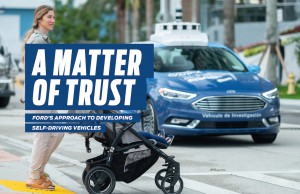A new study found that losing control of the vehicle and the threat of computer virus are the two most important reservations or fears consumers have about autonomous vehicles.
The study done by the University of Memphis’ FedEx Institute of Technology also found that AVs have yet to break through as status symbols. The study found that improving social status among peers is the least important incentive to adopting AVs. In addition, fewer than 5% of respondents indicated their households are willing to pay an additional $20,000 to add automation and greater connectivity to their vehicle.
One very interesting finding was that the feeling of losing control was more important than safety concerns for people. In addition, the threat of computer virus penetrating the vehicles was considered an important barrier to adoption.
Meanwhile, Ford Motor Co. has issued a 44-page report saying the company’s goal is to make Ford the most trustworthy brand of autonomous vehicle on the road. The report, “A Matter of Trust,” outlines the technology and procedures Ford is using to deploy its fleet of autonomous test vehicles.
(Ford’s Autonomic inks deal in China with Alibaba Cloud. Click Here for the story.)

GM Chairman and CEO Mary Barra shows off one of the 130 new self-driving Bolt EVs produced at its Orion Assembly plant.
Consumers were already skeptical about self-driving cars, but after an autonomous Uber vehicle struck and killed a 49-year-old woman in Tempe, Arizona, last winter perceptions didn’t improve any. Three quarters of the people responding to a survey by Pew said they’d prefer human drivers, even if self-driving cars were readily available.
Half of respondents said they’d never want a self-driving car.
Ford believes that “developing self-driving vehicles is not simply about the technology — it is about earning the trust of our customers and of those cities and businesses that will ultimately use it,” Sherif Marakby, CEO of Ford Autonomous Vehicles LLC, said in a letter to Transportation Secretary Elaine Chao that accompanies the report. “Safety, reliability and the experience the technology will enable are the key pillars to developing trust.”
(Click Here for more about Ford charging ahead with new autonomous vehicle unit.)
That point is underscored in the document itself, in which Ford emphasizes its slow-and-steady approach. “We are not in a race to be first to offer self-driving vehicles to the public,” the company says. “Our focus is on doing it correctly.”
Ford was the third company to deliver a voluntary safety report to the federal government. Waymo and General Motors also have filed the reports, which were suggested by the Obama administration in 2017.
Ford is currently field testing AVs in Miami, and is conducting driverless delivery pilots with Domino’s Pizza and Postmates. Waymo, the self-driving unit of Google parent Alphabet, is gearing up to launch a driverless ride-hailing service in Phoenix later this year, while GM’s Cruise has said it would launch its own robot taxi service in San Francisco in 2019.
(What’s going on at “The Factory?” Click Here for more on Ford’s other new project.)
Ford doesn’t plan to start building AVs until 2021.



I don’t recall any evidence of the consumer wanting self diving cars. So why is this even a perceived reality? Feels like evil intent